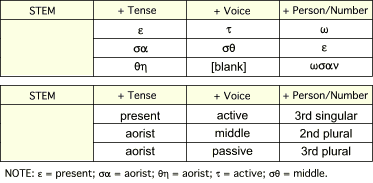The Imperative is used when the speaker is demanding that an action or a state:
- be started (do this / be that)
- be not started (don't do / don't be).
- be continued (keep doing / keep being)
- be stopped (don't keep doing / don't keep being)
Unlike the indicative mood, it does not express certainty on the part of the writer or speaker. Unlike the subjunctive mood, it does not express uncertainty on the part of the speaker. Unlike the optative mood, it expresses something more than mere hope. But as to the reality of the action or state involved, that is entirely dependent on the response of the person being addressed by the writer of the speaker. The response to the command, however, is not a factor in the grammatical concerns.
FORMS OF THE IMPERATIVE
Imperative forms are fairly
regular in their formative, except for the 2nd singular forms (which are excluded
from the chart below).
( Select one item
from each column in the order presented, then match each with the English
chart for a description of the full form.)




